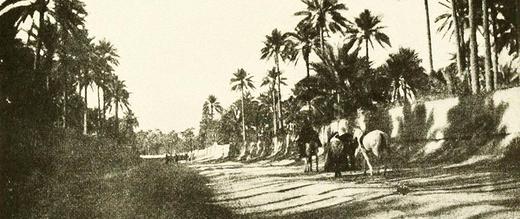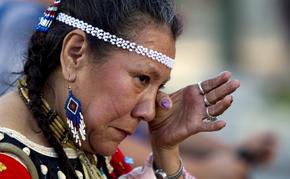The views expressed in our content reflect individual perspectives and do not represent the authoritative views of the Baha'i Faith.
Baha’u’llah, his family and his followers—facing banishment, exile, homelessness and prison—left the Garden of Paradise on the Twelfth Day of Ridvan.
Twelve days after the declaration of his new Faith, the time for Baha’u’llah’s departure had finally arrived. Exiled by government decree, Baha’u’llah and his family faced a perilous, grueling four-month journey through the hottest months of the year to an unknown destiny.
So at noon on the twelfth day of Ridvan, in early May of 1863, Baha’u’llah mounted his horse, a noble red roan stallion. Immediately surrounded by a large crowd of people begging for his blessings and imploring him not to go, he set out on the road toward Constantinople, clothed in majesty and leading a retinue of about 75 people including his family and an escort of Ottoman soldiers. One of Baha’u’llah’s followers, named Mirza Asadu’llah Kashani, couldn’t help himself and ran after the group:
Although Baha’u’llah had commanded the friends not to follow them, I was so loath to let Him go out of my sight, that I ran after them for three hours.
He saw me, and getting down from His horse, waited for me, telling me with His beautiful voice, full of love and kindness, to go back to Baghdad, and with the friends, to set about our work, not slothfully, but with energy:
“Be not overcome with sorrow—I am leaving friends I love in Baghdad. I will surely send to them tidings of our welfare. Be steadfast in your service to God, who doeth whatsoever He willeth. Live in such peace as will be permitted to you.”
We watched them disappear into the darkness with sinking hearts, for their enemies were powerful and cruel! And we knew not where they were being taken. An unknown destination!
Weeping bitterly, we turned our faces toward Baghdad, determined to live according to His command. – from Mirza Asadu’llah Kashani, quoted by Lady Blomfield in The Chosen Highway, pp. 122-123.
The soldiers who escorted the exiles on that long, dusty road were there to make sure Baha’u’llah’s message of peace and unity would be banished from Persia and Iraq:
Many of [Baha’u’llah’s] followers decided to abandon Baghdad also, and accompany him in his wanderings. When the caravan started, our company numbered about seventy-five persons. All the young men, and others who could ride, were mounted on horses. The women and [Baha’u’llah] were furnished wagons. We were accompanied by a military escort. – from an interview with Baha’u’llah’s daughter Bahiyyih Khanum, in Abbas Effendi, His Life and Teachings, by Myron H. Phelps.
But this was Baha’u’llah’s second exile, and would prove to be yet another failed attempt to banish his new Faith. Two more successive banishments followed, the final one to the pestilential prison-city of Akka in Palestine, where few people survived the terrible conditions. These cruel exiles, driven by rulers who feared the rapid spread of Baha’u’llah’s teachings, did not suppress or damage the Baha’i Faith—instead, they helped it spread and rendered it victorious:
Acclaiming that historic occasion as the “Most Great Festival,” the “King of Festivals,” the “Festival of God,” [Baha’u’llah] has … characterized it as the Day whereon “all created things were immersed in the sea of purification,” whilst in one of His specific Tablets, He has referred to it as the Day whereon “the breezes of forgiveness were wafted over the entire creation.” “Rejoice, with exceeding gladness, O people of Baha!”, He, in another Tablet, has written, “as ye call to remembrance the Day of supreme felicity, the Day whereon the Tongue of the Ancient of Days hath spoken, as He departed from His House proceeding to the Spot from which He shed upon the whole of creation the splendors of His Name, the All-Merciful … – Shoghi Effendi, God Passes By, pp. 153-154.
During the 12-day Ridvan period each year, Baha’is around the world also celebrate and mark the occasion by voting for and electing the democratic institutions that administer and guide their Faith.
Since Baha’is have no clergy, Baha’i communities govern themselves with democratically-elected bodies of nine people called Spiritual Assemblies, annually elected at the local and national level during the twelve days of Ridvan. Every five years, Baha’is also elect their global administrative body, the Universal House of Justice, during the same period.
Every year, when Baha’is gather to pray and silently cast their ballots for these unique democratic institutions, they affirm Baha’u’llah’s teachings of world unity; they symbolically celebrate the garden of humanity in all its diversity and beauty; and they recall that powerful declaration in the Garden of Ridvan, which heralded the appearance of a new prophet of God and established the new Faith of oneness and peace.

















Comments
Sign in or create an account
Continue with Facebookor